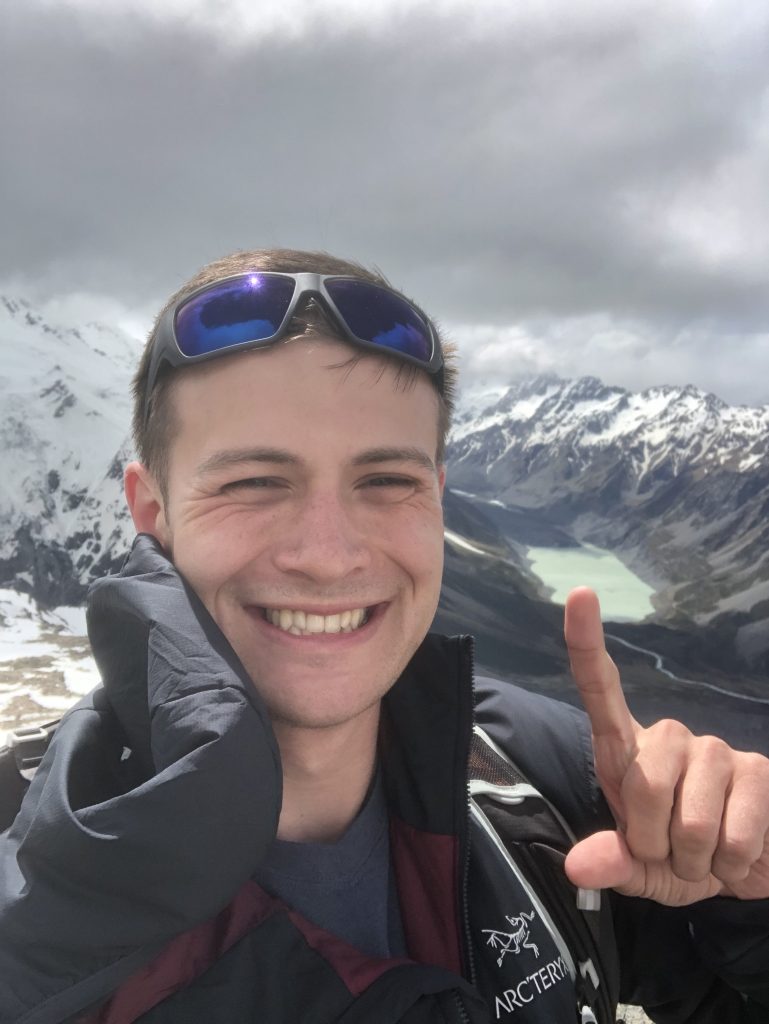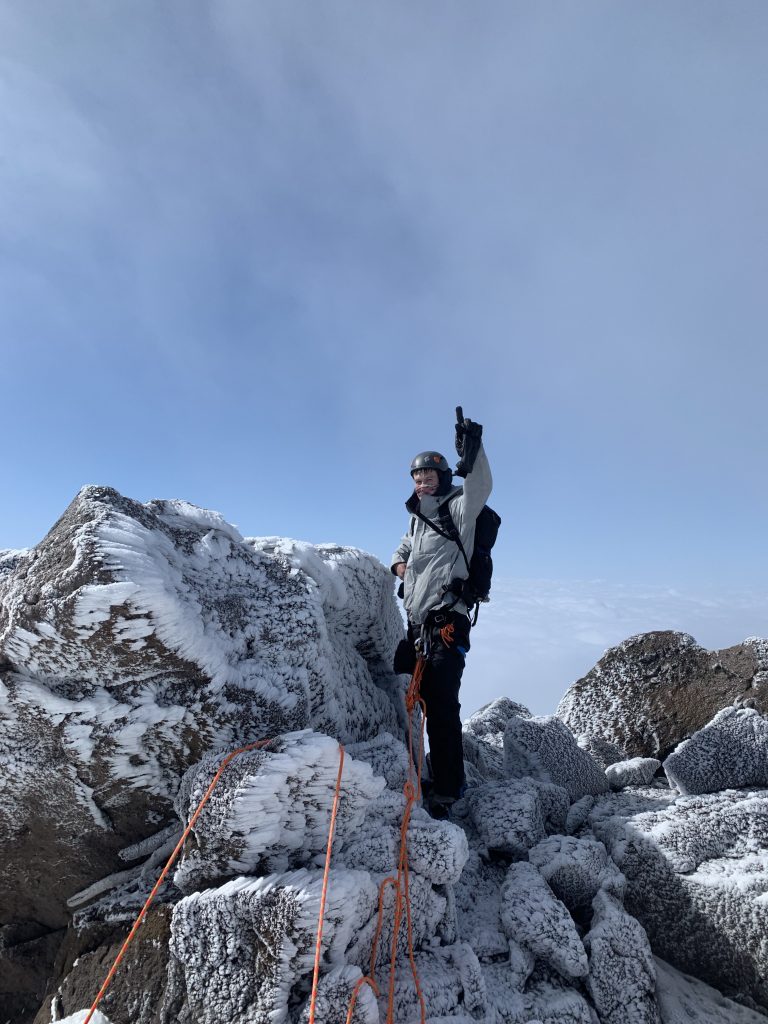Caleb Haas ’06: Connections Made Between Creativity and Creation
Theodore Caleb Haas (who goes by Caleb) has parents who were interested in Progressive education, and when they went searching for something unique with an emphasis on the natural world and child-directed academics, found The Miquon School.
The eldest of three siblings who all attended Miquon, Caleb started at the school as a Nursery student and graduated in 2006. As with so many Miquon alumni, Caleb’s earliest memory is of playing outdoors on Miquon’s wooded campus. Mention the creek and the bamboo forest and Caleb lights up. He remembers climbing trees, building a fort they called “The Shack,” and playing soccer, football, capture the flag, and his favorite — all-campus tag.
“This was the best game because we played at recess when all the grades were outside at the same time, with no plan,” he explains. “All it took was for a kid to call out ‘all-campus tag!’ and everyone from 1st grade to 6th would join in.” Starting with just one child who was IT, everyone who was tagged would become an “IT” and then the game would grow into “an epic game of tag across the campus. It was so cool because everyone was included, everyone could play,” he adds.
Fast-forward through the years, and the game of all-campus tag becomes a metaphor for Caleb’s entire Miquon experience — one of learning about the value of community and importance of the collaborative process, all while maintaining a sense of creativity, individuality and self-directed goal setting.

Caleb recalls class trips taken in 5th and 6th grades, for example, to Canada and Washington, D.C., respectively. Teachers, Joan Ranere and Jeri Bond Whatley would encourage the kids to come up with their own ideas through brainstorming sessions. This process of tossing out thoughts followed by group discussion would end with a unanimous decision.
While in Washington, the students made movies they would later present. Caleb set his film in the Japanese Tea House with Mira Sacks-Smith, whom he is still friends with today. In fact, most of his memories involve the group of his closest friends, then and now, including Daniel Stern, Jonah Rosen, Kate Finney and Desean Chestnut.
Tony Hughes, Caleb’s 5th-grade science teacher, taught students how to build a remote-controlled car in a year-long project. Students drew the design and built the wooden frame. “With Tony’s wisdom, his tools and his help, we got to create what was in our imaginations,” says Caleb. “We cut the wood, drilled holes, added wheels, sanded it all down, and had motors, created the circuits and soldered wires together, learning basic electrical skills. No other school teaches you that in this way, in my experience.”
Caleb talks a lot about the connections made at Miquon between “creation and creativity as tied to the natural environment.” He remembers his 1st grade teacher, Maryanne Yoshida, who led the students in tapping maple trees every fall to get their sap, with which they later made maple syrup.
“It was so cool, even though I didn’t fully understand what we were doing at the time,” says Caleb. “But the process involved in managing 100 trees, drilling holes, tapping them, understanding you have to protect the sap from bugs, etc. … that process was amazing, and we got to make a jar of maple syrup! This thing you would usually just get at the store, but we made it, and learned how it was really made.”
After graduation, Caleb attended Germantown Friends School through 12th grade, and found it “very different.”
“Suddenly, I had homework and grades, and a lot of it. We even had weekly planners,” he says. “Miquon taught me to give my all to everything and to finish what I began. It encouraged creativity, collaborative effort, respect and inclusion — a great foundation for where I went afterwards.”
Caleb found a liberal arts college in Los Angeles to continue his education, wanting something small because he was still trying to figure out what he wanted to do next. Occidental College had only 2,000 students when Caleb enrolled. During his last year of high school, Caleb continued to explore the movie-making process that he had begun at Miquon. “I believe I had developed a nontraditional approach to how I wanted to prioritize my life, and I didn’t want to sit in front of a textbook or in a lecture hall all the time,” he says.
So he studied media arts and culture, a small major (with only 10 students at the time), which encouraged him to learn about the whole filmmaking process, from writing a script to filming and submitting it to film festivals.
“It brought back the processes from Miquon of making the model car and maple syrup,” he says. “From start to finish, following through, experiencing an end product of all your work. And in both places, we were encouraged to answer the why in everything. Why are you making this movie and what are you trying to say?”

Summit of Glacier Peak in Washington State
Although he thought he would return to Philadelphia after graduating from Occidental, Caleb landed a production assistant job on a television show for about half a year, where he learned a lot. He moved next into production management for two years, and then left to start his own business, Caleb Productions, in which he live-streams performances — music and dance — creates podcasts and covers sports.
Caleb played rugby at Occidental and did some sports broadcasting while a student there. Patrick Guthrie, the coach of his college team is also a director and mentored him in both. “He sent me out on projects that challenged me, trusting me to figure it out. And I did. One of my best attributes is that I never quit until I figure something out.”
Caleb explains that rugby is “very fraternal, like the police and the military,” and he developed a strong bond of trust with players and coaches.
“I really enjoy this work. I get to meet passionate people who broadcast to the world what they do, and I get to help them,” he says. The work also feeds his creative side and desire for flexibility. “The idea of being stuck in one place is claustrophobic to me. I want to grow the business slowly to keep it manageable and maintain my sense of autonomy and creativity.”
He immediately recognizes the link between his Miquon experience and the work he does today. “Miquon gave me all the tools, encouraged me to be open, allowed a blank canvas and encouraged me to ask questions, be curious and figure things out,” he says. “Where else do you get open-ended research projects about what you’re interested in? I still ask a lot of questions and I’m always trying to find new things to figure out.”